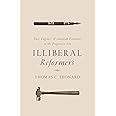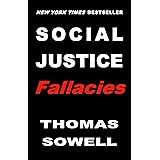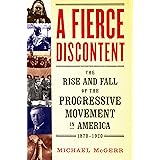
Baixe o app Kindle gratuito e comece a ler livros do Kindle instantaneamente em seu smartphone, tablet ou computador - sem a necessidade de um dispositivo Kindle.
Leia instantaneamente em seu navegador com o Kindle para internet.
Usando a câmera do seu celular, digitalize o código abaixo e baixe o app Kindle.

Imagem não disponível
Cor:
-

-
-
- Para ver este vídeo faça o download Flash Player
Seguir o autor
OK
Illiberal Reformers: Race, Eugenics, and American Economics in the Progressive Era Capa comum – 24 janeiro 2017
| Prazo | Total (R$) |
|---|---|
| Em 2x de R$ 122,16 sem juros |
R$ 244,31 |
| Em 3x de R$ 81,45 sem juros |
R$ 244,31 |
| Em 4x de R$ 61,10 sem juros |
R$ 244,31 |
| Em 5x de R$ 49,39 com juros |
R$ 246,97 |
| Em 6x de R$ 41,60 com juros |
R$ 249,64 |
| Em 7x de R$ 36,04 com juros |
R$ 252,30 |
| Em 8x de R$ 31,87 com juros |
R$ 254,96 |
| Em 9x de R$ 28,62 com juros |
R$ 257,62 |
| Em 10x de R$ 26,03 com juros |
R$ 260,31 |
| Em 11x de R$ 23,90 com juros |
R$ 262,98 |
| Em 12x de R$ 22,13 com juros |
R$ 265,64 |
Opções de compra e produtos complementares
The pivotal and troubling role of progressive-era economics in the shaping of modern American liberalism
In Illiberal Reformers, Thomas Leonard reexamines the economic progressives whose ideas and reform agenda underwrote the Progressive Era dismantling of laissez-faire and the creation of the regulatory welfare state, which, they believed, would humanize and rationalize industrial capitalism. But not for all. Academic social scientists such as Richard T. Ely, John R. Commons, and Edward A. Ross, together with their reform allies in social work, charity, journalism, and law, played a pivotal role in establishing minimum-wage and maximum-hours laws, workmen's compensation, antitrust regulation, and other hallmarks of the regulatory welfare state. But even as they offered uplift to some, economic progressives advocated exclusion for others, and did both in the name of progress. Leonard meticulously reconstructs the influence of Darwinism, racial science, and eugenics on scholars and activists of the late nineteenth and early twentieth centuries, revealing a reform community deeply ambivalent about America's poor. Illiberal Reformers shows that the intellectual champions of the regulatory welfare state proposed using it not to help those they portrayed as hereditary inferiors but to exclude them.
-
Número de páginas264 páginas
-
IdiomaInglês
-
EditoraPrinceton University Press
-
Data da publicação24 janeiro 2017
-
Dimensões15.88 x 1.91 x 22.86 cm
-
ISBN-100691175861
-
ISBN-13978-0691175867
Frequentemente comprados juntos

Clientes que compraram este item também compraram
Descrição do produto
Resenha Especializada
"Economists like to think of their ancestors as heroic seekers of truth, each generation, as Newton suggested, standing on the shoulders of the giants who came before. Thomas Leonard demonstrates clearly that the story of economics in late nineteenth- and early twentieth-century America was far more complex―and more interesting. He shows how the economists of that era combined their passion for social reform with religion, eugenics, and evolution theory in ways that seem incredible today. This book is an eye-opener."―Craufurd Goodwin, James B. Duke Professor of Economics Emeritus, Duke University
"This untold story of how Progressive Era activists helped construct the extensive role of government in the economy sheds light on today's technocratic dilemmas. Which decisions need to be left to experts, the ‘social engineers,' and which require democratic participation? Thomas Leonard's book demonstrates that during the Progressive Era this question was resolved only by combining democratic reform with the exclusion of women, African Americans, immigrants, and disabled people as full members of society. It underlines the fact that the tension between ‘expert' economic administration and individual liberties remains at the heart of current political debates."―Diane Coyle, author of GDP: A Brief but Affectionate History
"Illiberal Reformers makes a substantial contribution to the much contested history of U.S. progressivism by providing fascinating new evidence of what Leonard terms its ‘dark side.' This book's rich narrative will amply reward readers interested in the discrete histories of social science, science, politics, culture, industrial relations, and general U.S. history, and offers a wealth of new material on discrimination based on gender, race, and class."―Mary O. Furner, University of California, Santa Barbara
Contracapa
"Mythologies that arise around individuals, groups, and ideas of the past tend to mask many warts. Thomas Leonard's excellent book about American economics during the Progressive Era shows how progressives' efforts to champion reform drew on a vision of scientific development that would institutionalize the eugenic creed and, in the process, do great violence to the liberal project that had been at the heart of the American system. Illiberal Reformers provides a powerful lesson in the tensions that surround ideals of social progress, scientific expertise, and the democratic system."--Steven G. Medema, University of Colorado, Denver
"Economists like to think of their ancestors as heroic seekers of truth, each generation, as Newton suggested, standing on the shoulders of the giants who came before. Thomas Leonard demonstrates clearly that the story of economics in late nineteenth- and early twentieth-century America was far more complex--and more interesting. He shows how the economists of that era combined their passion for social reform with religion, eugenics, and evolution theory in ways that seem incredible today. This book is an eye-opener."--Craufurd Goodwin, James B. Duke Professor of Economics Emeritus, Duke University
"This untold story of how Progressive Era activists helped construct the extensive role of government in the economy sheds light on today's technocratic dilemmas. Which decisions need to be left to experts, the 'social engineers, ' and which require democratic participation? Thomas Leonard's book demonstrates that during the Progressive Era this question was resolved only by combining democratic reform with the exclusion of women, African Americans, immigrants, and disabled people as full members of society. It underlines the fact that the tension between 'expert' economic administration and individual liberties remains at the heart of current political debates."--Diane Coyle, author of GDP: A Brief but Affectionate History
"Illiberal Reformers makes a substantial contribution to the much contested history of U.S. progressivism by providing fascinating new evidence of what Leonard terms its 'dark side.' This book's rich narrative will amply reward readers interested in the discrete histories of social science, science, politics, culture, industrial relations, and general U.S. history, and offers a wealth of new material on discrimination based on gender, race, and class."--Mary O. Furner, University of California, Santa Barbara
Sobre o Autor
Detalhes do produto
- Editora : Princeton University Press; Reprint edição (24 janeiro 2017)
- Idioma : Inglês
- Capa comum : 264 páginas
- ISBN-10 : 0691175861
- ISBN-13 : 978-0691175867
- Dimensões : 15.88 x 1.91 x 22.86 cm
- Ranking dos mais vendidos: Nº 296,983 em Livros (Conheça o Top 100 na categoria Livros)
- Nº 106 em Importados de História dos EUA do Século 19
- Nº 424 em Importados sobre História Econômica
- Nº 433 em Importados de História dos EUA do Século 20
- Avaliações dos clientes:
Sobre o autor

Descubra mais livros do autor, veja autores semelhantes, leia blogs de autores e muito mais
Avaliações de clientes
| 5 estrelas |
|
73% |
| 4 estrelas |
|
19% |
| 3 estrelas |
|
7% |
| 2 estrelas |
|
0% |
| 1 estrela |
|
1% |
As avaliações de clientes, incluindo as avaliações do produto por estrelas, ajudam os clientes a saberem mais sobre o produto e a decidirem se é o produto certo para eles.
Para calcular a classificação geral por estrelas e o detalhamento percentual por estrelas, não usamos uma média simples. Em vez disso, nosso sistema considera coisas como o quão recente é uma avaliação e se o avaliador comprou o produto na Amazon. As avaliações também são analisadas para verificar a confiabilidade.
Saiba mais sobre como as avaliações de clientes funcionam na AmazonPrincipais avaliações de outros países
Originally, it was an Evangelical movement, that wanted to do good in the world. “The protest of the progressives originated not out of personal suffering but rather out of moral and intellectual discontent with the suffering (and enrichment) of others.” This ‘do-gooder’ attitude had a superiority complex at its heart, as found in most religions. Later the movement became more associated with secular preferences, yet retained its religious zeal. “The progressives’ urge to reform America sprang from an evangelical compulsion to set the world to rights, and they unabashedly described their purposes as a Christian mission to build a Kingdom of Heaven on earth. In the language of the day, they preached a social gospel.”
It was a movement that saw a problem with the individual humanism that existed in the United states, and wished to replace it with a more German efficiency. Many in the movement were inspired by Darwinian theory, and the US President, Woodrow Wilson, saw the government as a living organism “accountable to Darwin not to Newton.”
The movement promoted ‘Economics’ as a ‘scientific study’, often requiring its students to study in Germany. “Germany exposed the young Americans to the ideas of the German Historical School of political economy, with its positive view of state economic intervention, quintessentially compulsory insurance against sickness, industrial accidents, debility, and old age. Most of their German professors…were hostile to the idea of natural economic laws, which they disparaged as “English” economics, a swipe at the classically liberal tendency of political economy in Great Britain.”
“John R. Commons said that social progress required the individual to be controlled, liberated, and expanded by collective action. Columbia progressive economist Henry R. Seager …declared that the industrial economy had simply obviated the creed of individualism. Individuals, Ross maintained, were but “plastic lumps of human dough,” to be formed on the great “social kneading board.”
“Economics, Seligman told his receptive confreres, was going to be the basis of social progress, and economists were going to be the creators of the future; indeed, they would be the philosophers of American social life. A grateful public would pay deference to the economist’s expertise.”
In essence, progressives had a mechanistic view of human nature, that abhorred free will and saw people as ‘human ants’, or cogs in an economic machine. On the whole, they despised democracy, promoting an aristocratic ‘expert’ governing elite of ‘betters’ on a second-class citizenry. They had little to no regard for individual people, preferring to substitute Social Darwinian attitudes. In a separate article, ‘Mistaking Eugenics for Social Darwinism’, Leonard distinguishes the original Darwinian theories from those emanating from Herbert Spencer’s ‘Survival of the fittest’. It was the latter that led to Eugenics, a ‘set of beliefs and practices that aim to improve the genetic quality of a human population, typically by excluding people and groups judged to be inferior and promoting those judged to be superior.’
The eventual destination of eugenics was found amongst Germany’s most infamous leader, Adolf Hitler. There, he adopted a racist ideology that saw the ‘Aryan race’ as the superior race, and led to the extermination of millions of Jews, Disabled, Gipsies and other groups deemed inferior.
The question that needs to be asked of today’s progressives is whether they still see themselves as morally superior? In adopting a creed, such as ‘hate speech’, do they view anyone who dissents as an inferior human being? Worse still, as a lesser person? If so, the racism, so evident in early progressive ideology, is still there (albeit camouflaged by adherence to the creed of ‘Critical Theory’, where the ‘whites’ have replaced the ‘blacks’ and ‘men have replaced ‘women’ as the underclass).
This book is a warning to all those who flock, without thinking, to a ‘progressive’ political ideology. Be careful that, in a wish to do good, you do not do irrevocable harm instead. For instance, look at the current deference being paid to the SAGE (Scientific Advisory Group for Emergencies) group ‘advising’ government on its Covid-19 strategy. Are we becoming too reliant on ‘experts’ and their ‘scientific models’? Are epidemiologists the new economists? Have we lost confidence in ‘common sense’ and allowed ourselves to lose our liberties without debate?
Why 'liberate' government???
''Government, Wilson said, was a living organism, “accountable to Darwin, not to Newton.” Since no living thing can survive when its organs work against one another, a government must be free to adapt to its times, or else it will perish. The adaptation Wilson had in mind was to neutralize Congress and consolidate power in a vigorous executive.''
What? Neutralize congress! Free will for officials and none for people?
''It was a plan he had been elaborating and revising for more than thirty years, an early version of which, Congressional Government, he completed while still a graduate student at Johns Hopkins.''
Freedom of humans to freedom for government. Wow!
How did 'liberal' (meaning allowing each human to manage and exercise his own free will) change to the demand that all individuals submit to the control of experts and government? Leonard provides a chilling answer.
This is a review of how the 'progressives' moved into the ruling class and removed freedom from American culture in the name of 'Science'. Fascinating!
PART I
The Progressive Ascendancy
Redeeming American Economic Life
Turning Illiberal
Becoming Experts
Efficiency in Business and Public Administration
PART II
The Progressive Paradox
Valuing Labor: What Should Labor Get?
Darwinism in Economic Reform
Eugenics and Race in Economic Reform
Excluding the Unemployable
Excluding Immigrants and the Unproductive
Excluding Women
Epilogue
From the prologue - ''The progressives combined their extravagant faith in science and the state with an outsized confidence in their own expertise as a reliable, even necessary, guide to the public good. They were so sure of their own expertise as a necessary guide to the public good, so convinced of the righteousness of their crusade to redeem America, that they rarely considered the unintended consequences of ambitious but untried reforms.
Even more so, they failed to confront the reality that the experts—no less than the partisans, bosses, and industrialists they aimed to unseat—could have interests and biases of their own.''
''It is important to understand that the progressive campaign to exclude the inferior from employment was not (merely) the product of an unreflective prejudice. Progressive arguments warning of inferiority were deeply informed by elaborate scientific discourses of heredity. Darwinism, eugenics, and race science recast spiritual or moral failure as biological inferiority and offered scientific legitimacy to established American hierarchies of race, gender, class, and intellect.
Economic progressives were profoundly influenced by Darwin and other evolutionists. Chapter 6 shows how the economic progressives (and their critics) drew deeply on evolutionary science’s conceptions of heredity, progress, competition, selection, fitness, organism, and the role of human beings in controlling nature. Chapter 7 shows the uses economic progressives made of race science and eugenics, the social control of human breeding.
Among other things, biological ideas offered Progressivism a conceptual scheme capable of accommodating the great contradiction at the heart of Progressive Era reform—its view of the poor as victims deserving state uplift and as threats requiring state restraint."
''Eugenics and race science are today discredited. But the progressive vision of how to govern scientifically under industrial capitalism lives on. Expertise in the service of an administrative state, what progressives called social control, has survived the discredited notions once used to uphold it. Indeed, it has thrived.'' Chilling.
''Government, Wilson said, was a living organism, “accountable to Darwin, not to Newton.” Since no living thing can survive when its organs work against one another, a government must be free to adapt to its times, or else it will perish. The adaptation Wilson had in mind was to neutralize Congress and consolidate power in a vigorous executive.'' (65)
Government is alive in a more important way than individuals. Germany, Russia both adopted this belief at this time. Hitler, Stalin destroyed (30 million? 65 million?) in service to this concept.
A stunning theme - ''THE MENACE OF THE UNEMPLOYABLE''
''The term “unemployable,” popularized by Sidney and Beatrice Webb, was a misnomer, for many of the unemployable were, in fact, employed and others desperately wanted to be. The Webbs used the term to describe people incapable of work, as well as those who could work but who accepted wages below a standard reformers judged acceptable. The latter group posed the threat.''
Sacrifice people to heartless theory. What theory?
''Of all ways of dealing with these unfortunate parasites, the Webbs opined, “the most ruinous to the community is to allow them unrestrainedly to compete as wage earners.” For the unemployable class, “unemployment is not a mark of social disease, but actually of social health.” When New York state established America’s first industrial labor colony in 1911, it was applauded by the AALL as a scientific and humane method of keeping the unemployable out of labor markets, thus improving employment prospects for the worthy poor.''
This is done as ''Science''!
The last three paragraphs express Leonard's considered conclusions -
''Progressivism reconstructed American liberalism by dismantling the free market of classical liberalism and erecting in its place the welfare state of modern liberalism. The new liberalism discarded economic liberties as archaic impediments to necessary improvements to society’s health, welfare, and morals. It is well known that modern liberalism permanently demoted economic liberties. Few twenty-first-century progressives think that minimum wages or maximum hours or occupational licensing unjustly infringe upon a worker’s right to freely contract on her own behalf. But the original progressives’ illiberal turn did not stop at property and contract rights.''
This attack Liberty did not end.
''They assaulted political and civil liberties, too, trampling on individual rights to person, to free movement, to free expression, to marriage and to reproduction. The progressives denied millions these basic freedoms, on grounds that their inferiority threatened America’s economic and hereditary security.''
''They were wrong on both counts. That did not stop them, nor has it stopped those who, unaware of the history, repeat the same false claims today.''
Leonard writes in a rational, analytical style. Nevertheless, this history is stunning. The emotional impact can/should be profound.
Around seven-hundred footnotes. Provides insight into the present by looking into the past.
''The past is not dead, it is not even past''
(See also - ''The Sacred Project of American Sociolgy'' - Christian Smith; ''Progress and Anarchy in Modern America'' - Robert Nisbet; ''Liberal Fascism: The Secret History of the American Left, From Mussolini to the Politics of Meaning'', by Jonah Goldberg; the New Work by Arthur Herman “1917 - Wilson and Lenin’’, great!)
本書によれば、そもそも米国で20世紀初め、左翼の政治圧力により最低賃金法が導入された際、その目的は、技能・経験に乏しい代わりに低賃金を強みに働く移民や非白人を排除し、白人労働者の賃金を高く保つことだった。排除の背後には当時流行の優生学思想があったという、背筋の凍るような事実も描かれる。以下は第9章より抜粋。(数字は位置ナンバー)
1910年代米国で経済学者たちは最低賃金について論争し、賛否は別として、次の点で意見が一致した。すなわち最低賃金規制が成功すれば、生産性の低い労働者は仕事がなくなる。非熟練労働者は雇うコストが上がると雇われなくなる。(3335)
米国の左翼進歩派知識人の多くは、最低賃金法を支持した。(移民や非白人など)生産性の低い労働者が職を失い、雇われなくなることは承知のうえである。彼ら改革者はそれを犠牲ではなく、社会への利益と考えたのである。(3356)
米国の左翼進歩派知識人は、能力の劣った者が最低賃金で仕事を失っても不都合はないと考えた。それによって他の労働者の賃金が高くなり、米国の賃金水準が守られるし、アングロサクソンの人種統合も保たれるからだ。(3359)
最低賃金は、劣った労働者を見つけ、科学的に取り扱う役目を果たすとされた。英国の社会主義者でフェビアン協会の中心人物であるウェッブ夫妻によれば、文明社会は最低賃金によって「産業上の病人」を労働力から取り除いたという。(3363)
最低賃金による隔離では不十分な場合、能力の劣った人々に避妊手術を強制せよとシカゴ大学の神学者兼社会学者ヘンダーソンは提案した。能力の優れた人々に子供をもっと多く生むよう求めるのは、不公正で非現実的だからという。(3373)
Perhaps Leonard's greatest contribution is his inclusion of all sides of the political impact of progressive ideas. Today, progressivism is associated exclusively with the left. Leonard documents how early progressive ideas also were championed by Republican leaders such as Theodore Roosevelt. The idea that systematic policy could be created for the common good by gathering and evaluating data in a scientific manner dates to this era and was a conscious rejection of the previous view of the economy as a self-correcting mechanism best left alone. Entire new fields of academic study--economics, sociology, political science, public administration--were developed to provide a cadre of "experts" to steer government and society.
Leonard does an excellent job of tracing how the idea that society must be managed impacted thought and policy in the early twentieth century. Darwinian ideas were adapted to fit ideology, with races ranked in status. Anglo-Saxons--presumably the "most evolved" race--were to be encouraged to produce more children. "Lesser" races--including immigrants from southern Europe, as well as Asians, Africans, and Latinos--were to be kept separate, excluded from the gene pool if not from the country altogether. Policies from forced sterilization, prohibition, and discouraging women from college and employment all stemmed from the idea of protecting the preferred Anglo-Saxon race. The needs of the individual were to be subordinated to the good of society as a whole.
Leonard ends his account by noting that World War I dealt a heavy blow to early progressivists assurance that progress was inevitable and that social change could be scientifically managed. He notes the idea of eugenics has been widely discredited, particularly in the wake of the horrors of Nazi rule and the Second World War. The one element that would have added to the value of "Illiberal Reformers" would have been a brief concluding survey of how progressive ideology evolved in later decades. Today, the name "progressive" and the idea of managing economies and government for social betterment are largely associated with the left. Meanwhile, early progressive ideas of race, particularly the view of whites as a superior group facing demographic "race suicide" are now associated with the fringe right. A brief survey of how this split evolved would only have further strengthened this excellent history.











